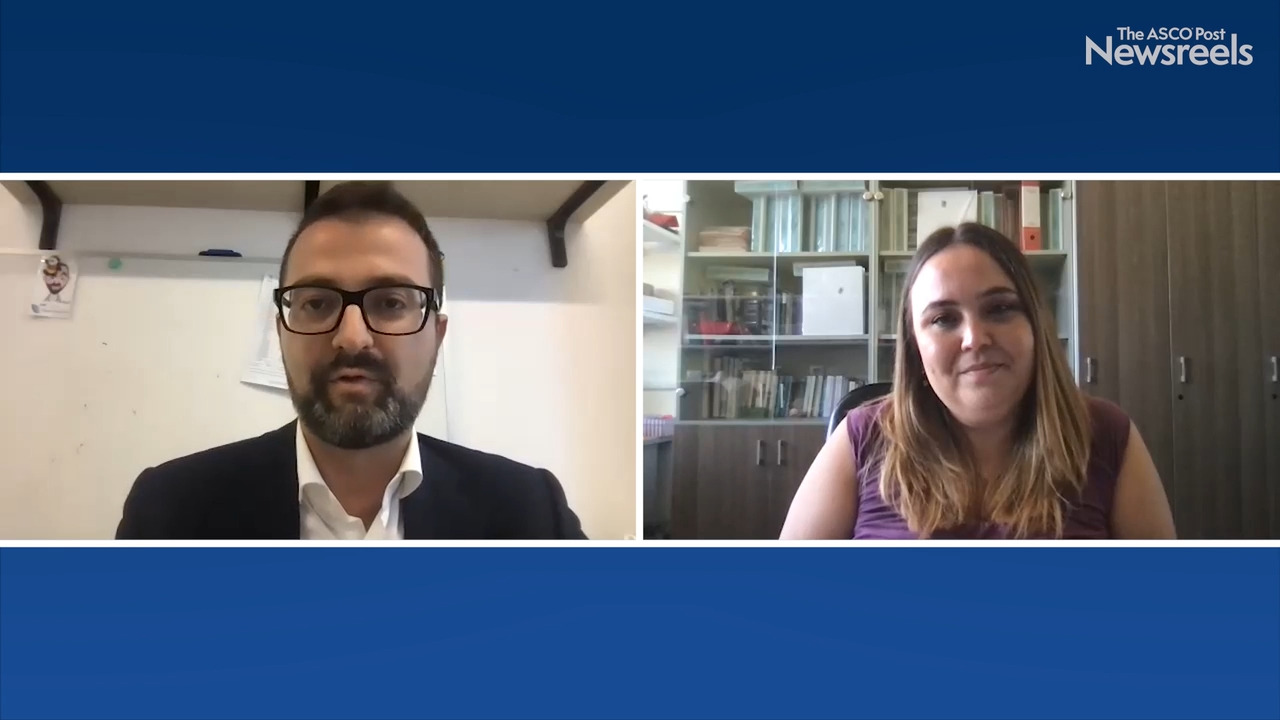Nicoletta Colombo, MD, on Cervical Cancer: KEYNOTE-826 Trial of Pembrolizumab Plus Chemotherapy
ESMO Congress 2021
Nicoletta Colombo, MD, of the Istituto Europeo Oncologico, discusses phase III results that showed improvements in progression-free and overall survival with a combination of pembrolizumab plus chemotherapy, compared with placebo and chemotherapy, for patients with persistent, recurrent, or metastatic cervical cancer. These benefits were seen regardless of PD-L1 expression and concomitant bevacizumab use, suggesting that pembrolizumab plus chemotherapy, with or without bevacizumab, may be a new standard of care for this population (Abstract LBA2).
Related Videos
The ASCO Post Staff
Hope S. Rugo, MD, of the University of California, San Francisco, discusses phase III results from the KEYNOTE-355 study of pembrolizumab plus chemotherapy, which improved overall survival vs chemotherapy alone in patients with previously untreated locally recurrent, inoperable, or metastatic triple-negative breast cancer whose tumors expressed PD-L1 (Abstract LBA16).
The ASCO Post Staff
Neeraj Agarwal, MD, of Hunstman Cancer Institute at the University of Utah, discusses efficacy and safety results from the COSMIC-021 study, in which cabozantinib plus atezolizumab demonstrated clinically meaningful activity and a manageable safety profile in patients with metastatic castration-resistant prostate cancer. The findings support a phase III study of these agents vs a second line of novel hormonal therapy (Abstract LBA24).
The ASCO Post Staff
Susana N. Banerjee, MBBS, PhD, of The Royal Marsden NHS Foundation Trust, discusses phase II results of the EORTC-1508 trial, the first study to combine an anti–PD-L1 antibody, atezolizumab, with bevacizumab and the COX1/2 inhibitor acetylsalicylic acid as treatment for patients with ovarian, fallopian tube, or primary peritoneal adenocarcinoma (Abstract LBA32).
The ASCO Post Staff
Jason J. Luke, MD, of UPMC Hillman Cancer Center, discusses phase III results showing that adjuvant pembrolizumab for patients with resected stage IIB and IIC melanoma decreased the risk of disease recurrence or death by 35% compared with placebo. It was also associated with significantly prolonged recurrence-free survival (Abstract LBA3).
The ASCO Post Staff
Filippo Pietrantonio, MD, and Federica Morano, MD, both of the Istituto Nazionale dei Tumori, discuss results from the MAYA trial, which provided proof of concept that temozolomide-induced hypermutation may be exploited to achieve durable responses to low-dose ipilimumab plus nivolumab in patients with microsatellite stable metastatic colorectal cancer (Abstract 383O).





